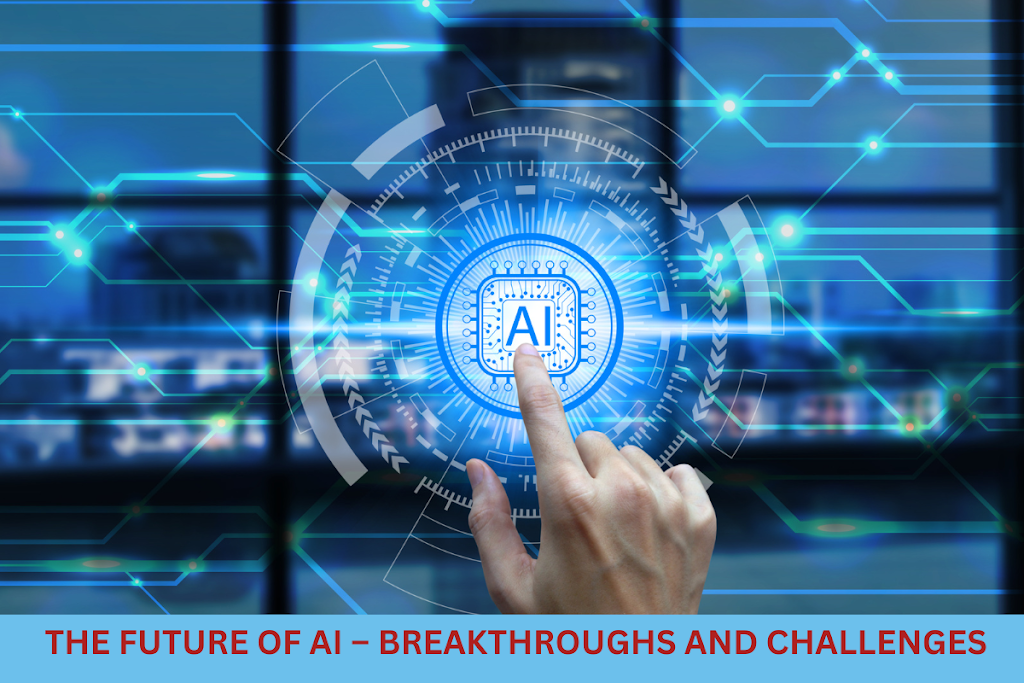The Future of AI – Breakthroughs and Challenges
Artificial Intelligence (AI) is rapidly transforming our world, influencing industries, businesses, and daily life. With continuous advancements, AI is making incredible breakthroughs while also presenting significant challenges. Understanding both aspects is essential to harness AI’s full potential while addressing its risks. In this article, we explore the future of AI, its groundbreaking innovations, and the challenges that lie ahead.
Breakthroughs in AI
1. Advanced Natural Language Processing (NLP)
One of the biggest breakthroughs in AI is in Natural Language Processing (NLP). Tools like OpenAI’s GPT models and Google’s BERT have revolutionized how machines understand and generate human language. These models enable AI to perform tasks like automated content generation, real-time translation, and sentiment analysis with impressive accuracy. In the future, NLP is expected to become even more sophisticated, allowing seamless human-AI interactions.
2. AI in Healthcare
AI is revolutionizing healthcare by enhancing diagnostics, drug discovery, and personalized medicine. Machine learning algorithms can detect diseases like cancer in early stages with greater accuracy than human doctors. AI-driven drug development is accelerating research, reducing the time needed to develop new treatments. Additionally, wearable AI-powered devices help monitor health conditions in real time, improving patient care and early intervention.
3. Autonomous Systems and Robotics
Self-driving cars, drones, and robotic automation are transforming industries. Companies like Tesla, Waymo, and Boston Dynamics are developing autonomous machines capable of performing complex tasks with minimal human intervention. These AI-driven systems are expected to improve transportation, logistics, and manufacturing, leading to safer and more efficient processes.
4. AI in Creativity and Entertainment
AI is making significant strides in creative fields, generating music, art, and even writing stories. AI-powered tools like DALL·E and DeepDream create stunning digital artworks, while AI-generated music compositions are being used in films and games. The entertainment industry is witnessing a new era where AI collaborates with human creativity to produce engaging content.
5. AI in Finance and Business
Financial institutions and businesses are leveraging AI for fraud detection, risk assessment, and algorithmic trading. AI-powered chatbots and virtual assistants are enhancing customer service by providing instant responses and personalized experiences. With the rise of AI-driven analytics, companies can make data-driven decisions faster and more accurately than ever before.
Challenges in AI Development
1. Ethical and Bias Issues
One of the major challenges AI faces is ethical concerns and biases in decision-making. AI systems learn from large datasets, and if the data contains biases, the AI model will reflect them. This can lead to discrimination in hiring, lending, and law enforcement. Ensuring fairness and transparency in AI decision-making is crucial to prevent social inequalities.
2. Privacy and Security Risks
As AI becomes more integrated into daily life, concerns about data privacy and cybersecurity are growing. AI-driven surveillance, facial recognition, and data collection raise questions about personal privacy. Cybercriminals can also exploit AI for malicious purposes, such as deepfake technology and AI-driven hacking. Strengthening security measures and developing AI regulations is necessary to protect individuals and organizations.
3. Job Displacement and Workforce Impact
Automation powered by AI is replacing many traditional jobs, especially in manufacturing, customer service, and administrative roles. While AI creates new job opportunities, the transition requires workforce reskilling and adaptation. Governments and businesses must invest in education and training programs to prepare workers for an AI-driven economy.
4. AI’s Lack of Common Sense and Decision Accountability
Despite its advancements, AI still lacks human-like common sense and emotional intelligence. AI models can analyze data and generate predictions, but they struggle with understanding context and making ethical decisions. Additionally, determining accountability when AI systems make mistakes remains a challenge, especially in critical fields like healthcare and autonomous driving.
5. Energy Consumption and Environmental Impact
AI models, particularly deep learning algorithms, require vast computational power, leading to high energy consumption. Training large AI models contributes to carbon emissions, raising concerns about AI’s environmental impact. Researchers are working on developing energy-efficient AI models to reduce their carbon footprint while maintaining performance.
Conclusion
The future of AI holds incredible potential, with groundbreaking innovations shaping various industries. From advanced NLP and healthcare applications to autonomous systems and creative AI, the possibilities are limitless. However, challenges such as ethical concerns, job displacement, and security risks must be addressed to ensure responsible AI development. By balancing innovation with ethical considerations, AI can become a transformative force that benefits humanity while minimizing risks. The journey ahead requires collaboration among researchers, policymakers, and businesses to navigate the complexities of AI’s evolution successfully.






